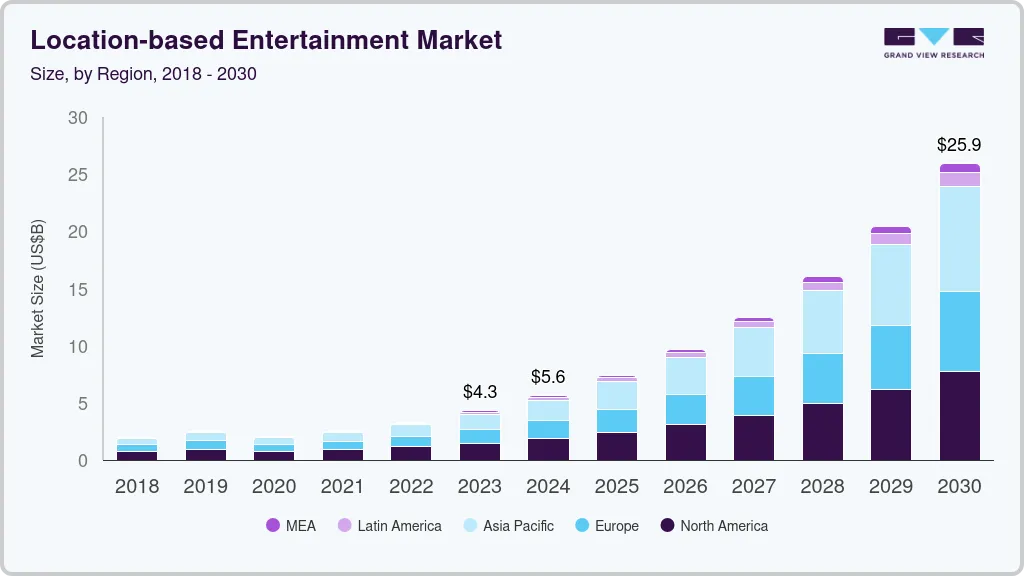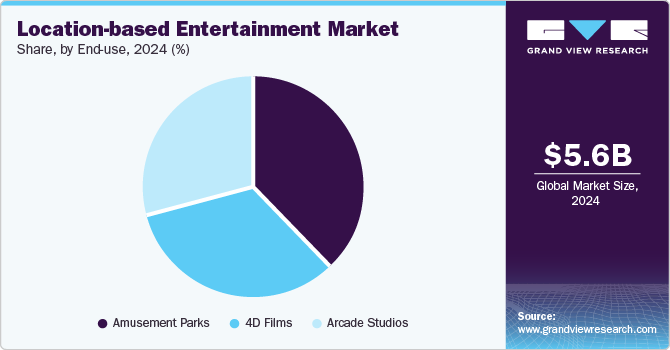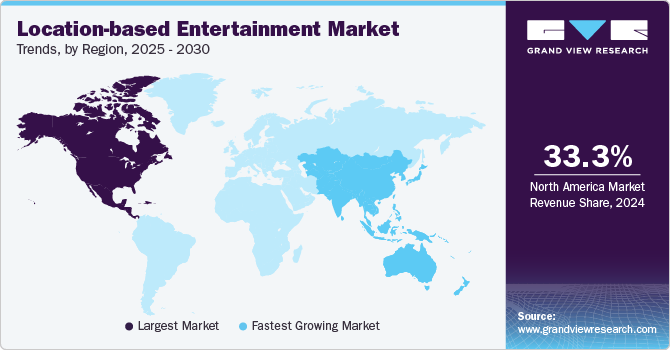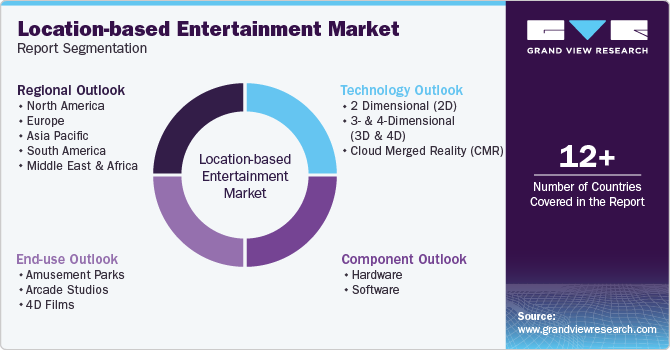- Home
- »
- Next Generation Technologies
- »
-
Location-based Entertainment Market Size Report, 2030GVR Report cover
![Location-based Entertainment Market Size, Share & Trends Report]()
Location-based Entertainment Market (2025 - 2030) Size, Share & Trends Analysis Report By Component, By End-use (Amusement Parks, Arcade Studios, 4D Films), By Technology, By Region, And Segment Forecasts
- Report ID: GVR-4-68038-118-4
- Number of Report Pages: 180
- Format: PDF
- Historical Range: 2018 - 2024
- Forecast Period: 2025 - 2030
- Industry: Technology
- Report Summary
- Table of Contents
- Interactive Charts
- Methodology
- Download FREE Sample
-
Download Sample Report
Location-based Entertainment Market Summary
The global location-based entertainment market size was estimated at USD 5.63 billion in 2024 and is projected to reach USD 25.90 billion by 2030, growing at a CAGR of 28.5% from 2025 to 2030. The market has seen significant growth driven by several factors, including the increasing demand for immersive experiences among consumers.
Key Market Trends & Insights
- The North America location-based entertainment market holds a high share, of 33.3%.
- The location-based entertainment market in the U.S. is anticipated to grow at a CAGR of over 25.6% from 2025 to 2030.
- By component, the hardware segment holds a significant share in the location-based entertainment (LBE) market.
- By technology, the amusement park segment commands a high share in the location-based entertainment market.
- By end-use, the dimensional (3D) segment holds a substantial share of the location-based entertainment market.
Market Size & Forecast
- 2024 Market Size: USD 5.63 Billion
- 2030 Projected Market Size: USD 25.90 Billion
- CAGR (2025-2030): 28.5%
- North America: Largest market in 2024
As people seek more engaging and interactive entertainment options, location-based entertainment (LBE) venues such as escape rooms, virtual reality arcades, and augmented reality experiences have gained popularity. Additionally, advancements in technology have enhanced the quality of these experiences, making them more appealing. The rise of social media and the desire for shareable experiences also contribute to this trend, as consumers are drawn to unique activities that they can showcase to their networks.Governments worldwide are recognizing the potential of the location-based entertainment market as a driver for tourism and economic development. Initiatives aimed at enhancing infrastructure, providing funding for LBE projects, and promoting tourism can significantly impact sales in this sector. For example, tax incentives for businesses that invest in LBE facilities or support for public-private partnerships can stimulate growth. Additionally, government-led campaigns to attract visitors to entertainment hubs can boost foot traffic, benefiting local LBE businesses and contributing to overall market expansion.
The market is ripe with growth opportunities, particularly as consumer preferences shift toward experiential activities. The integration of emerging technologies, such as virtual and augmented reality, offers new avenues for innovation and engagement. Furthermore, expanding into underrepresented markets and demographics presents significant potential for growth. As urban areas become increasingly saturated, exploring opportunities in suburban and rural regions can also lead to untapped customer bases. Collaborations with brands for promotional events or themed experiences can further enhance attractiveness and drive sales.

Manufacturers in the location-based entertainment sector are strategically focusing on growth by investing in new technologies and innovative solutions. By developing cutting-edge equipment and platforms tailored for LBE applications, these companies aim to enhance the overall experience for consumers. This includes advancements in gaming hardware, immersive environments, and interactive installations. Additionally, manufacturers are prioritizing partnerships with LBE operators to create customized offerings that meet the specific needs of venues, thereby strengthening their market position and driving mutual growth.
Technological innovation is a key driver of transformation within the location-based entertainment market. Breakthroughs in virtual reality (VR), augmented reality (AR), and interactive gaming technologies have revolutionized how consumers engage with entertainment experiences. Innovations such as location tracking, gesture recognition, and immersive storytelling techniques enhance the interactivity and realism of LBE offerings. Moreover, the use of mobile applications to enhance customer experiences-by enabling features such as booking, social sharing, and personalized interactions-continues to evolve. As technology advances, it will further shape the future of location-based entertainment, attracting a wider audience and increasing overall engagement.
Component Insights
The hardware segment holds a significant share in the location-based entertainment (LBE) market, driven by the essential role that physical equipment plays in delivering immersive experiences. As venues such as virtual reality arcades and escape rooms become more popular, the demand for advanced hardware-such as VR headsets, motion sensors, and high-performance computers-has surged. This growth is further fueled by technological advancements that enhance the quality and realism of LBE experience, making cutting-edge hardware indispensable. Additionally, the ongoing trend of creating more interactive and engaging environments requires investment in innovative equipment, solidifying the hardware segment's prominence in the market.
The software segment is experiencing significant growth within the location-based entertainment market, largely due to the increasing demand for engaging and customizable experiences. As operators seek to differentiate themselves, the development of sophisticated software solutions that facilitate immersive storytelling, gamification, and interactive content has become essential. Furthermore, the rise of mobile applications that enhance user engagement and streamline operations-such as booking systems, loyalty programs, and real-time analytics has spurred growth in this segment. The integration of software with hardware solutions creates a seamless experience for consumers, driving further investment and innovation in the software segment.
Technology Insights
The amusement park segment commands a high share in the location-based entertainment market, bolstered by its established presence and widespread appeal. These parks attract millions of visitors annually, offering a diverse range of attractions and experiences that cater to various demographics. Factors such as continuous investment in new rides, themed experiences, and seasonal events enhance their attractiveness, driving higher foot traffic. Moreover, the incorporation of technology, such as virtual reality experiences and interactive attractions, keeps amusement parks relevant and engaging, ensuring their sustained dominance in the LBE market.
The arcade studios segment is witnessing significant growth during the forecast period, fueled by a resurgence of interest in retro and modern gaming experiences. As social spaces encourage interaction and competition, arcade studios appeal to a wide audience, including families, friends, and gaming enthusiasts. The introduction of new gaming technologies, such as VR and AR, has revitalized the arcade experience, attracting a new generation of players. Furthermore, collaborations with popular franchises and the incorporation of multiplayer options enhance the appeal of arcade studios, contributing to their rapid growth in the LBE landscape.
End-use Insights
The dimensional (3D) segment holds a substantial share of the location-based entertainment market, driven by the growing consumer preference for immersive experiences. 3D technology enhances the visual appeal and realism of attractions, making them more engaging for audiences. As advancements in 3D projection and interactive elements become more accessible, venues can create dynamic environments that captivate visitors. This technology is particularly effective in applications such as themed attractions, educational experiences, and immersive storytelling, ensuring that the dimensional segment remains a key player in attracting audiences and generating revenue.

The Cloud Merged Reality (CMR) segment is experiencing considerable growth from 2025 to 2030, driven by the increasing demand for innovative, hybrid experiences that blend physical and digital elements. CMR technology allows for real-time interaction with both virtual and augmented environments, enhancing engagement and offering unique experiences. As more venues adopt CMR solutions, they can provide immersive attractions that appeal to tech-savvy consumers. Additionally, the scalability and flexibility of cloud-based solutions enable operators to continuously update and customize experiences, fostering ongoing consumer interest and driving further growth in this dynamic segment.
Regional Insights
The North America location-based entertainment market holds a high share, of 33.3% driven by a combination of advanced technology adoption and a strong consumer preference for immersive experiences. The region is home to numerous entertainment hubs, including amusement parks, arcades, and VR venues, which continually attract significant foot traffic. Additionally, North American consumers are increasingly seeking unique experiences that blend entertainment with social interaction, further boosting demand for location-based offerings. The presence of major entertainment companies and a well-developed infrastructure also contribute to the region's robust market share, making it a leader in the LBE sector.

U.S. Location-based Entertainment Market Trends
The location-based entertainment market in the U.S. is anticipated to grow at a CAGR of over 25.6% from 2025 to 2030. The country boasts a diverse range of amusement parks, gaming centres, and interactive experiences that cater to various demographics. This diversity is complemented by significant investments in technology and infrastructure, enhancing the overall consumer experience. Furthermore, the U.S. is a trendsetter in the entertainment industry, influencing global market dynamics through its popular culture and entertainment innovations, thus solidifying its position as a key market player.
Asia Pacific Location-based Entertainment Market Trends
The location-based entertainment market in Asia Pacific is expected to record the highest growth rate of over 30.7% from 2025 to 2030. As more people move to urban centers, the demand for recreational activities and entertainment options has surged. Additionally, the growing popularity of immersive experiences, such as VR arcades and theme parks, is attracting consumers seeking unique forms of entertainment. The region's diverse cultural landscape also encourages the development of innovative and localized experiences, further propelling growth. Investments in infrastructure and entertainment technology continue to enhance the appeal of location-based entertainment in Asia Pacific, driving its rapid expansion.
The India location-based entertainment market is experiencing high growth, driven by a youthful population and changing consumer preferences. With a large demographic of millennials and Gen Z seeking out novel entertainment experiences, there is an increasing demand for interactive and immersive attractions. The rapid expansion of urban areas and increasing disposable incomes are also contributing to the growth of entertainment venues such as arcade centers, VR experiences, and themed attractions. Additionally, the emergence of technology-driven entertainment solutions aligns well with the aspirations of Indian consumers, fostering a vibrant LBE market that is poised for continued expansion
The location-based entertainment market in China is experiencing remarkable growth, driven by rapid economic development and a burgeoning middle class. As disposable incomes rise, consumers are increasingly willing to spend on leisure activities and entertainment. The country's expanding urban population is also a key factor, as urban centers are becoming hubs for entertainment options like theme parks and VR experiences. Furthermore, the Chinese government's support for the entertainment industry through investments and infrastructure development has created a favorable environment for LBE businesses. This combination of economic growth and consumer demand positions China as a significant market player.
Europe Location-based Entertainment Market Trends
The Europe market is witnessing significant growth, fueled by a strong focus on innovation and consumer engagement. European consumers are increasingly drawn to immersive experiences, and the region is home to numerous cutting-edge entertainment venues that utilize advanced technologies such as AR and VR. Additionally, the tourism sector plays a vital role in driving LBE growth, as popular tourist destinations frequently integrate entertainment options to attract visitors. The commitment to sustainability and unique cultural experiences further enhances the appeal of LBE offerings in Europe, contributing to its robust market expansion.
Key Location-based Entertainment Company Insights
Some of the key players operating in the market include Huawei Technologies Co., Ltd., Microsoft Corporation, and Samsung Electronics Co. Ltd.
-
Huawei Technologies Co., Ltd. is one of the prominent global providers of smart devices and information and communication technology infrastructure. The company focuses on engineering, technology, products, and solutions to address consumer needs. It offers products, including consumer products and business products. Consumer products include phones, laptops, tablets, wearables, audio, routers, EMUI, and accessories.
-
Microsoft Corporation is a manufacturer and provider of computer hardware & software solutions. In addition, the company also supplies consumer electronics devices. Microsoft Corporation manufactures products such as Xbox & related devices and offers solutions for businesses, developers & IT professionals, students, and educators. It offers virtual reality and augmented reality in location-based entertainment facilities.
Key Location-based Entertainment Companies:
The following are the leading companies in the location-based entertainment market. These companies collectively hold the largest market share and dictate industry trends.
- 4Expeience
- CamOnApp
- Google LLC
- Cisco HQ Software, Inc
- HTC Corporation
- Huawei Technologies Co., Ltd
- Magic Leap, Inc
- Microsoft Corporation
- Niantic, Inc.
- Samsung Electronics Co. Ltd.
- Springboard VR
- VRstudios Inc
Recent Developments
-
In April 2024, Niantic, Inc. and Trivver, are working together to develop the precise solution for the AR Ad Measurement with 3D Smart Objects to the improve the quality and experience.
-
In February 2024, Kuwait Telecommunications Company (stc) and Huawei entered into a Memorandum of Understanding (MoU) to enhance their strategic cooperation and business monetization in the 5.5G sector. Through joint innovation in 5.5G technology, the two companies aim to develop intelligent wireless networks based on 5.5G and foster the creation of new services related to 5.5G for consumers, households, and businesses, thereby advancing the maturity of the 5.5G industry and ecosystem.
-
In January 2024, Samsung Electronics launched Visual eXperience Transformation platform, it is a cloud-native Content Management Solution which integrates content and remote signage management into a single secure platform.
Location-based Entertainment Market Report Scope
Report Attribute
Details
Market size in 2025
USD 7.39 billion
Revenue forecast in 2030
USD 25.90 billion
Growth rate
CAGR of 28.5% from 2025 to 2030
Actual data
2018 - 2024
Forecast period
2025 - 2030
Quantitative units
Revenue in USD million/billion, and CAGR from 2025 to 2030
Report coverage
Revenue forecast, company ranking, competitive landscape, growth factors, and trends
Segments covered
Component, technology, end-use, region
Regional scope
North America; Europe; Asia Pacific; South America; Middle East & Africa
Country scope
U.S.; Canada; Mexico; Germany; UK; France; China; Japan; India; South Korea; Australia; Brazil; UAE; Saudi Arabia; South Africa
Key companies profiled
4Expeience; CamOnApp; Google LLC; HQ Software; HTC Corporation; Huawei Technologies Co., Ltd.; Magic Leap, Inc.; Microsoft Corporation; Niantic, Inc.; Samsung Electronics Co. Ltd.; Springboard VR; VRstudios Inc.; AEON Fantasy Co., Ltd.; American Changer Corp.; Barron Games International; Bob’s Space Racers; Cinepolis; e-Learning Studios; KidZania Operations S.A.R.L.; Overseas Chinese Town Enterprise Co. (OCT) Parks; Regal Entertainment Group; Six Flags Entertainment Corporation; Universal Studios Park and Resorts (Comcast Corporation); The Walt Disney Company
Customization scope
Free report customization (equivalent up to 8 analysts working days) with purchase. Addition or alteration to country, regional & segment scope.
Pricing and purchase options
Avail customized purchase options to meet your exact research needs. Explore purchase options
Global Location-based Entertainment Market Report Segmentation
This report forecasts and estimates revenue growth at the global, regional, and country levels along with analyzes the latest market trends and opportunities in each one of the sub-segments from 2018 to 2030. For this study, Grand View Research has further segmented the global location-based entertainment market report based on component, technology, end-use, and region:

-
Component Outlook (Revenue, USD Million, 2018 - 2030)
-
Hardware
-
Software
-
-
Technology Outlook (Revenue, USD Million, 2018 - 2030)
-
2 Dimensional (2D)
-
3- & 4-Dimensional (3D & 4D)
-
Cloud Merged Reality (CMR)
-
-
End-use Outlook (Revenue, USD Million, 2018 - 2030)
-
Amusement Parks
-
Indoor
-
Outdoor
-
-
Arcade Studios
-
4D Films
-
-
Regional Outlook (Revenue, USD Million, 2018 - 2030)
-
North America
-
U.S.
-
Canada
-
Mexico
-
-
Europe
-
Germany
-
UK
-
France
-
Rest of Europe
-
-
Asia Pacific
-
Japan
-
China
-
India
-
South Korea
-
Australia
-
Rest of Asia Pacific
-
-
South America
-
Brazil
-
Rest of South America
-
-
Middle East and Africa (MEA)
-
Saudi Arabia
-
UAE
-
South Africa
-
Rest of MEA
-
-
Frequently Asked Questions About This Report
b. Key factors that are driving the location-based entertainment market growth include increasing consumer spending on games, and video content, rising and growing mass consumer adoption of AR, VR, and mixed reality entertainment services.
b. The global location-based entertainment market size was estimated at USD 5.63 billion in 2024 and is expected to reach USD 7.39 billion in 2025.
b. The global location-based entertainment market is expected to grow at a compound annual growth rate of 28.5% from 2025 to 2030 to reach USD 25.90 billion by 2030.
b. Asia Pacific is expected to register the fastest CAGR of around 30.7% from 2025 to 2030 in the location-based entertainment market.
b. Some key players operating in the location-based entertainment market include Microsoft Corporation; Springboard VR; HTC Corporation; Six Flag Entertainment Corporation; Universal Parks and Resorts; and VRstudios Inc.
b. The hardware segment accounted for the largest revenue share of over 64% in 2023 and is expected to continue dominating the location-based entertainment market growth over the forecast period.
Share this report with your colleague or friend.
Need a Tailored Report?
Customize this report to your needs — add regions, segments, or data points, with 20% free customization.

ISO 9001:2015 & 27001:2022 Certified
We are GDPR and CCPA compliant! Your transaction & personal information is safe and secure. For more details, please read our privacy policy.
Trusted market insights - try a free sample
See how our reports are structured and why industry leaders rely on Grand View Research. Get a free sample or ask us to tailor this report to your needs.










